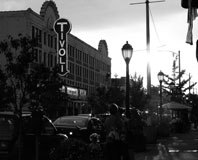
Portrait of God as Mission Fig & Female Fig Wasp: a Dialogue
Portrait of God as the Most Kissed Woman in the World
Ars Poetica with Ghosts
Driving Highway 80 with My Husband After Contemplating Suicide and Later Reading Pema Chödrön
Portrait of God as Mission Fig & Female Fig Wasp: a Dialogue
Fat-bellied men
in pointy hats
We are starful
in our plentitude
batwing scrotums
sexy when ripe
beckoned by an echo of scent
feverfish in flight, pollen-light
squeeze us into any box
we take its shape
disinterested in sting
we burrow
turn us on our side
we’re platypusian
into the sweet and meaty heart
that sustains you
one father tried
to namesake us
the journey a severing we sacrifice our wings
palmed us over
along with a pox
eschew escape
pirouette the ever-after
but we are thousands
floral mycelium
shade-gathering
hands pluck the tender fruit
we blossom inside ourselves
invite death, melt all danger
sun warm and sticky
fear-pressed, your lips
on our wet, pink tongues our work, awaiting joy
Portrait of God as the Most Kissed Woman in the World
Workmen pulled your body from that green turn of river,
and push or jump, no one could say, and no one
claimed you until the death doctor anointed your face with oil
applied thin and threaded layers of plaster, the scent of wet dust
rising into the morgue. The plaster became the shape of your
cheekbones, your brow, the secret on your lips.
Soon, wax filled the place where your face had been.
We gave you names: Unknown Woman, Drowned Woman, Woman of Sorrows, Woman of Many Fears, Woman Who Was Pushed or Woman Who Didn’t Want to Die, but Didn’t Want to Live This Life, Woman Who Was Only a Girl, Resusci Annie.
Forgive us; we hung your face on our walls.
Forgive the toymaker who tinkered you into doll shape,
who gave you a collapsible chest and a kissable mouth.
Forgive our cracked palms on your torso, our foul breath in your lungs.
Forgive us as you perpetually drown, and we can never save
ourselves enough, and we have forgotten that you always had a name.
How many times did we discuss our pomes
while sipping coffee, corner table, nights
near windows overlooking Merritt’s lights,
the winter lake itself like poetry.
Prosciutto, pasta, mascarpone, red wine,
our supper, always courses. Bellies full
before the words he’d say, his apron snug
on button-down. Then, panettone, tea,
and tales of war, of Nazis. Questions held
him hostage still; the trek to Italy.
Il bel paese didn’t wait, but she—
his bella signorina—later, wife—was there.
We write, and what is poetry if not
the paper boats of children, far from shore,
a little wind-torn, turning turtle—lost
among the currents, Oakland’s tidal slough.
Renato’s out there now, ghost gondolier
of dark—imagine—setting our boats ablaze.
Driving Highway 80 with My Husband After Contemplating Suicide and Later Reading Pema Chödrön
Three big rigs surround us, packed tight and full with bee boxes,
and through the mesh meant to protect them I watch as some bees hold to their hives,
and others cling to truck metal, and many more are caught by the wind,
flung against windshields where their pollen-laden bodies smack
and spatter gold across the glass.
My keeper husband says the pollinators tossed beyond
the rushing river of vehicles will be lost without a colony to call them home,
and I try, Pema, to let the sorrow blow through me, knowing
even the bees that arrive at the central valley orchards
will likely be contaminated and die, too, but not before dusting the blossoms
that allow the tree to fruit with almond kernels and grow
to fatten my favorite chocolate bars. I confess
I do turn away then, toward the actual river, brown and slow, the low,
photogenic iron bridge in the distance, and the unhoused folks
camped along the banks, and why not me, I've wondered so often,
the gusts blowing hard against the hives stacked high inside my ribs,
each piece of me—a nameless something that cannot withstand the gales
of sorrow—is dragged from the house my heart has made and wanders
lost along the water's edge where there’s a roofless shelter of blue sky
and tarps strung from branch to bare January branch, and where someone
is living a life right there on the other side.
Patricia Caspers is an award-winning columnist, journalist, and poet. Caspers’ work has been published widely, and in 2017 California Newspapers Association named her the best columnist and best education reporter in the state. Caspers won the Nimrod-Hardman Pablo Neruda Prize Poetry and has published two full-length collections: Some Flawed Magic (Kelsay Books, 2021) and In the Belly of the Albatross (Glass Lyre Press, 2015). She is the founding editor-in-chief of West Trestle Review and hosts the monthly literary reading series and open mic, Silver Tongue Saturdays in Auburn, California. Caspers graduated from Mills College with an MFA in creative writing. She is a Unitarian Universalist.

